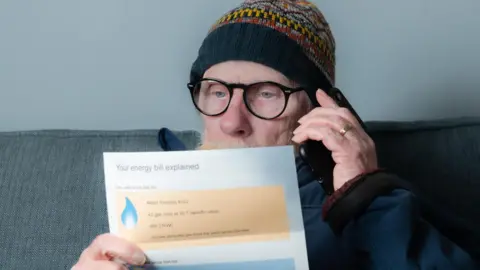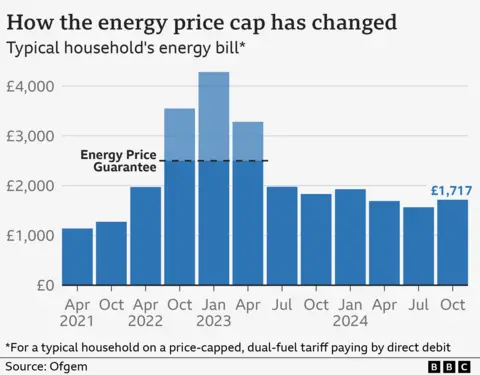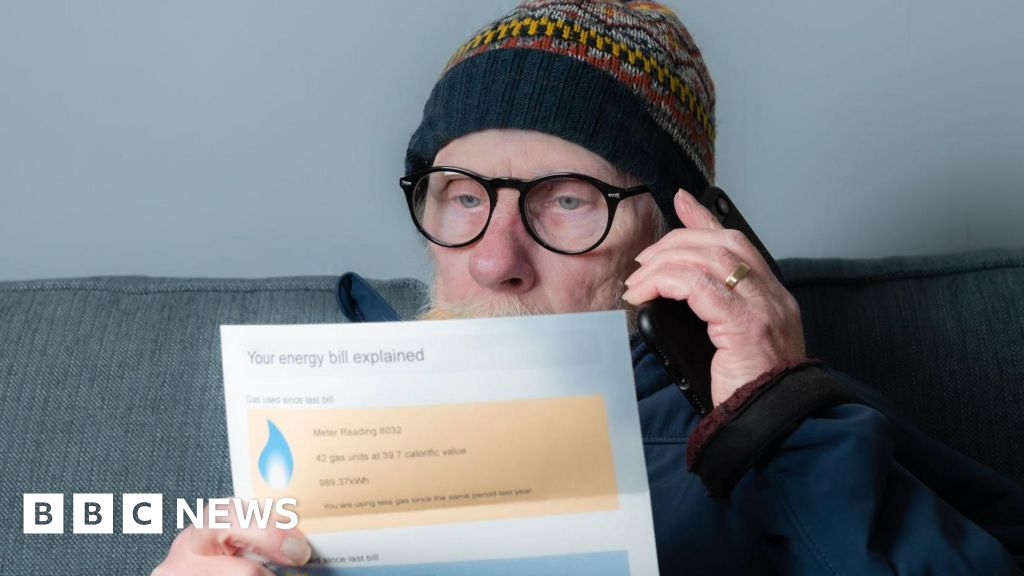 Getty Images
Getty ImagesA typical household’s annual energy bill will rise by £149 in October under the new price cap.
People using an average amount of gas and electricity will pay £1,717 a year, a 10% rise compared with now.
The cap, set by regulator Ofgem, affects the price paid for each unit of gas and electricity used in 28 million homes in England, Wales and Scotland.
Although prices are still lower than last winter, some government support has since been withdrawn for millions of billpayers.
Energy prices governed by the price cap have fallen twice this year – in April and July – but are to head back up in the run-up to winter.
They will remain about £117 a year cheaper for a typical household than in October last year, but analysts say another rise in prices is likely in January.
Ofgem said the latest rise was the result of rising prices on the international energy market, owing to increasing geopolitical tensions and extreme weather driving competition and demand for gas.


Prices are much lower than their peak, but they remain well above pre-Covid pandemic levels, and financial support from the government has either been wound down or is being cut.
The final cost-of-living payment was made to eight million people on means-tested benefits in February, and the new government has announced it will halt winter fuel payments for 10 million pensioners in England and Wales this autumn. The payment is a devolved matter in Scotland and Northern Ireland.
That will hit Billy and Sylvia Cunningham, a couple aged in their 70s from Warrington.
“We did get the help last year, but we still felt the cold, we still had to wrap in blankets and watch the smart meter shooting up,” said Mrs Cunningham.
Her husband has Parkinson’s and struggles when he gets cold. “It’s hard work sometimes,” he said. “If your fingers are freezing, you can’t do nothing.”


The couple are just £100 above the threshold to qualify for pension credit, a state pension top-up, and so will also miss out on the winter fuel payment worth another £200. One unexpected bill, they said, could push them into an overdraft as higher prices had already eroded their savings buffer.
Some households are already in debt to their supplier and now face increased prices in the run up to winter.
Energy Secretary Ed Miliband said the increase in prices would be “deeply worrying” for families.
“We will also do everything in our power to protect billpayers, including by reforming the regulator to make it a strong consumer champion, working to make standing charges fairer, and a proper warm homes plan to save families money,” he said.
Standing charges overhaul
Although the price cap is changed every three months, it is illustrated by Ofgem in terms of an annual bill for a household using a typical amount of gas and electricity.
People in larger properties will tend to pay more overall due to higher energy usage, while those in smaller properties likely use less so pay less.
As well as announcing the new price cap, Ofgem also outlined options to change the standing charge billing system.
Standing charges are the fixed daily fees paid for being connected to the system, but unaffected by how much people use.


How some pensioners can claim support
An estimated 880,000 low-income pensioner households eligible for pension credit currently fail to claim it.
The government says it is worth an average of £3,900 a year and claiming it can qualify people for other financial support such as winter fuel payments.
You can check your eligibility for pension credit via the government’s online calculator.
Information is also available on how to make a claim. There is also a phone line available on weekdays – 0800 99 1234.
Guide to benefits, when you qualify and what to do if something goes wrong, are provided by the independent MoneyHelper website, backed by government.
Benefits calculators are also run by Policy in Practice, and charities Entitledto, and Turn2us.


